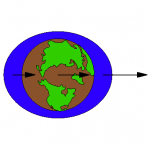[An updated treatment of some of this material appears in Chapter 11 of the Energy and Human Ambitions on a Finite Planet (free) textbook.]
 Having now sorted solar, wind, and tidal power into three “boxes,” let’s keep going and investigate another source of non-fossil energy and put it in a box. Today we’ll look at hydroelectricity. As one of the earliest renewable energy resources to be exploited, hydroelectricity is the low-hanging fruit of the renewable world. It’s steady, self-storing, highly efficient, cost-effective, low-carbon, low-tech, and offers a serious boon to water skiers. I’m sold! Let’s have more of that! How much might we expect to get from hydro, and how important will its role be compared to other renewable resources?
Having now sorted solar, wind, and tidal power into three “boxes,” let’s keep going and investigate another source of non-fossil energy and put it in a box. Today we’ll look at hydroelectricity. As one of the earliest renewable energy resources to be exploited, hydroelectricity is the low-hanging fruit of the renewable world. It’s steady, self-storing, highly efficient, cost-effective, low-carbon, low-tech, and offers a serious boon to water skiers. I’m sold! Let’s have more of that! How much might we expect to get from hydro, and how important will its role be compared to other renewable resources?
Last week, as soon as I put tidal power into a box labeled “waste of time,” I received some deserved howls of protest. I saw it coming, and had built in words to soften the “waste of time” label. But it was a poor choice from the start. A better set of labels is “abundant,” “potent,” and “niche.” The last could also be thought of as “boutique,” in that it is cute, perhaps decorative, may serve some function, but will never be a heavy lifter. The “potent” label—formerly “useful”— is meant to indicate a source that could supply a healthy fraction (say over a quarter) of our global demand if fully exploited. We will never fully exploit any resource, so the numbers at least need to support ¼-scale before we can believe that it may play a major role.
I should also point out that all along, my approach is to pretend that our goal is to keep up our current energy standards in a post-fossil-fuel world. In the process, we will see just how hard that will be to do. It is by no means impossible, but it’s much more difficult and compromised than most people realize. In the end, it is not clear that we will maintain our current global rate of energy usage: the future is unwritten. On the plus side, some of the approaches I cast into the “niche” box may become “potent” in a scaled-down world. Firewood was once abundant, then moved to potent, and is now a niche. But a reversal of fortunes could change all that.
Continue reading →
Views: 33022




